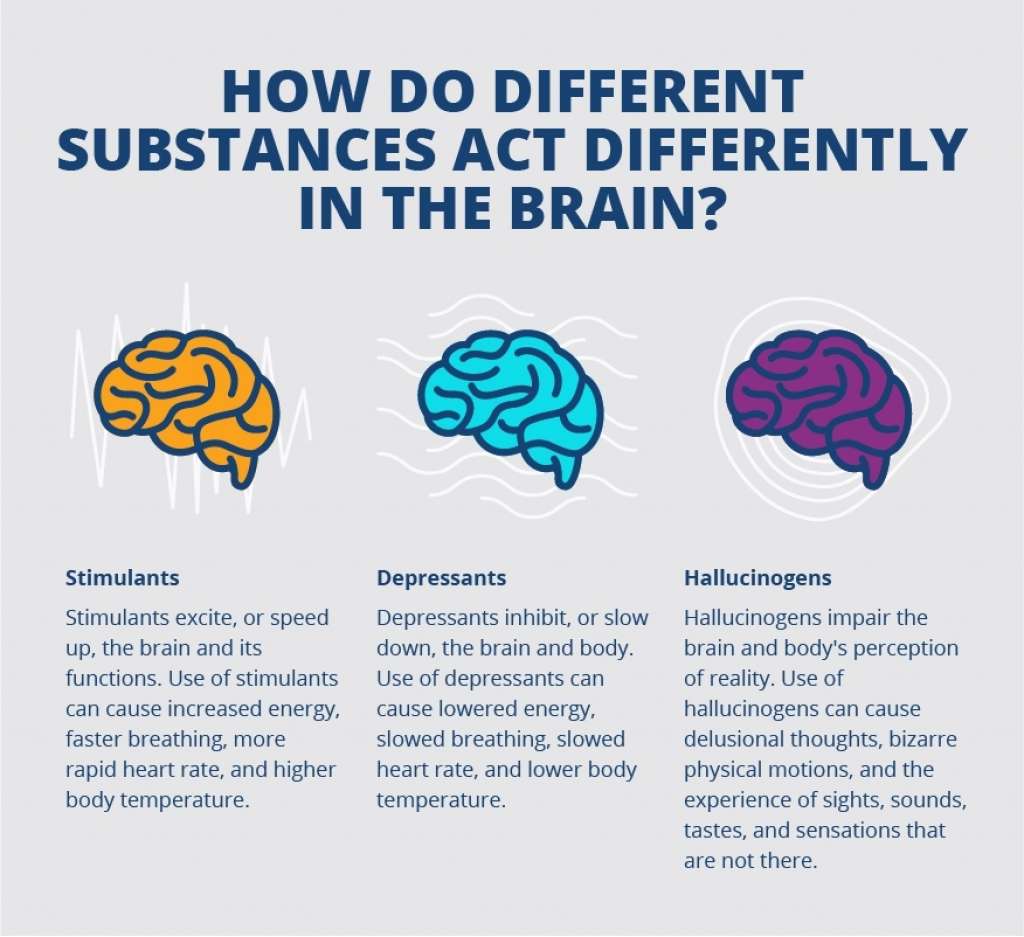Last Updated: November 18, 2021
A drug that ranks behind only alcohol and tobacco in popularity, marijuana fits into two groups. However, many people seem to wonder, Is Weed a Stimulant or Depressant? Some experts call it a stimulant, while others classify it as a depressant. Still, some researchers say that hallucinogen describes it better. However, most medical professionals agree to call it both a stimulant and a depressant. Not knowing what to call marijuana can confuse you. How many times have you asked, is marijuana a stimulant or depressant?” The answer can make a difference. You may decide not to use it when you know what it does to your body medically. If you need FREE help please contact the National Helpline about mental and/or substance use disorders, prevention, treatment, and recovery in English and Spanish.

Using Different Descriptions for the Same Drug
Instead of wondering, “Is cannabis a depressant or a stimulant?” some facts can give you a truthful answer. When you think about marijuana, you know that it comes from the cannabis plant. What you need to know about it requires an understanding of different drug classifications. Whether one or the other, marijuana can trigger psychotic episodes in vulnerable users.
Types of Stimulants
Caffeine
The stimulant caffeine comes in full-strength tea or coffee, chocolate candy bars, and your favorite soft drinks. It affects some of the same areas of your brain as cocaine, but it does it differently. As a mind-altering substance, it has more users in the world than any other.
You can notice the stimulant effect as your heart rate increases, making you breathe faster. The way you move responds to marijuana as it changes your motor skills and can make driving a car unsafe.
Nicotine, Cocaine, and Meth
Nicotine in tobacco works as a stimulant too, but people cannot get it as easily as caffeine. Even less available, cocaine use breaks the law, but its use as a stimulant tends to appeal to many. Meth, an addictive stimulant, requires a prescription or illegal manufacture.
Marijuana, a complex chemical, qualifies as a stimulant as it affects your attention span. Also, it limits your long-term memory. Smoking marijuana may present more cancer risk than tobacco. These answers can help you reply to someone who asks, is marijuana a stimulant or depressant. As a stimulant, it makes most people have more energy and feel happy and alert.
Types of Depressants
Marijuana shares the ability to work as a depressant and stimulant as alcohol does. As a psychoactive drug, a substance that affects your mental functions, it may result in damaging your mind or brain. As a depressant, marijuana slows brain functions. When you wonder is marijuana a stimulant or depressant, you can find out if either one helps or harms you.
As a depressant, marijuana gives you plenty of signs of the effects on your body. It starts by increasing a brain chemical that limits activity. While helpful for people who have anxiety or cannot sleep, it can change how you feel and behave. Your ability to think and speak can change, and you may have confusion and slurred speech.
Lower blood pressure may occur along with slower breathing. Light-headedness, headache, and dizziness occur as effects that depressants produce. The complex mix of symptoms can make it hard to answer a question that someone may ask. With knowledge, you have a reply to the inquiry, is cannabis a depressant or a stimulant. As you learn more, you can see that it can act as both a depressant and stimulant.
Is Weed a Stimulant or a Depressant?
The dual aspects of marijuana let it produce different reactions that show its stimulant effects. You can expect it to perform opposite to the depressive effect that it creates on some people. The question is cannabis a depressant or a stimulant has two answers.
It can act as a depressant sometimes and as a stimulant on another occasion. A drug must produce some effects that experts agree on as essential to qualify as a stimulant.
Stimulant Effects of Marijuana
An increase in heart rate and blood pressure makes it a stimulant, and it produces again elsewhere. Energy level and appetite have an upsurge, and feelings of paranoia become intense. The unpleasant experience can make you distrust others and feel that they suspect you of something.
Stimulants can increase anxiety and heart problems as well. Among the pleasant effects that it can produce, a feeling of well-being can elevate mood, energy, and alertness. Feelings of euphoria may create the rewards that please some users, and others may choose it to boost self-confidence.
Shy people who often prefer to remain quiet can present a different appearance entirely. By becoming lively and talkative, you may show the effect that a stimulant has unless it produces the opposite results. The National Institutes on Health confirms what you probably already know: Stimulants sharpen your attention, focus your mind and boost your energy. Along with those increases comes higher blood pressure, respiration, and heart rate.
Even when asking, “Is marijuana a stimulant or depressant?” it might seem like being a stimulant has good outcomes, it may not do so when you least expect it. Confused thoughts can prevent focusing or paying attention, and a lack of concentration can occur. You may feel depressed and not understand why. Discomfort may show up as discouragement, sadness, and despair.
Depressive Effects of Marijuana
A decision to use a drug to tamp down responses may make sense when it helps control anxiety, insomnia, and muscle spasms. Other than helping with those, your body may react with responses that you do not like. The answer to your question is cannabis a depressant or a stimulant may require experiences that you do not want.
An accepted purpose of a depressant requires it to release tension and relax muscles. The depressant effects include memory loss and decreased coordination. A typical response to marijuana as a depressant makes you want to sleep or rest.

Some effects that you may experience when marijuana acts as a depressant include slowing your brain’s functions. Although it can provide relief from anxiety and difficulty sleeping, it can produce bad outcomes. Some short-term effects may decrease the coordination that you need for driving or flying. Also, it can impair the accuracy of your memory.
Dizziness and blurred vision can occur, your breath rate may slow down, and blood pressure may decrease in the short term. As a depressant or stimulant, marijuana has strong addictive qualities.
As marijuana affects your nervous system, it can calm your nerves and relax your muscles. Other effects that you may expect to experience include lightheadedness, blurred vision, and dizziness. Your speech may become more deliberate, and you may find that you slur some words.
A decrease in coordination may make you move about clumsily and have trouble keeping your balance. Nausea and confusion may come with using marijuana when it acts as a depressant.
Watching for Interactions with Other Substances
The importance of is marijuana a stimulant or depressant may increase when you want to know about potential dangers. Since you know that it can act as both, you may also see the risks involved with using it. Fear of the unknown can serve as a guide that cautions you to avoid using marijuana with prescription drugs, alcohol, or tobacco.
Marijuana’s effect on you depends on your experiences with it or other drugs, how you take it, and the strength of a dose. Also, your gender and biological makeup influence how it affects you. What science knows for sure can help you decide to avoid mixing marijuana with any other substance.
The combination can produce a more powerful effect than either can have alone. Smoking tobacco and marijuana at the same time can expose you to harmful chemicals. Even more, you risk damaging your lungs and your heart.
When you take prescription drugs, you can count on your body to react appropriately when you take them as directed. Mixing them with marijuana can change the way they work in ways that you cannot imagine. Your reaction to marijuana as a depressant may significantly increase the impact on your body.
The National Institute on Drug Abuse cites depressants as drugs that can slow your brain to help you cope with stress. However, they cause the drowsiness that you may feel if marijuana acts as a depressant for you. A double dose can prove dangerous to your health.
Psychology Today reports that stimulants such as amphetamines, meth, and cocaine can increase your energy and alertness. However, their ability to increase your heart rate, blood pressure, and respiration may create a risk when marijuana acts as a stimulant. Too much exposure can put your health at risk.
Finding a Path Forward with Professional Help
Our compassionate approach to anyone suffering from addiction provides help when you need it the most. We know that you can get the sobriety you want and regain a healthy lifestyle free of drugs. Our treatment home for you offers a safe environment that encourages recovery with shared spaces.
Here at CNV Detox, you can find the support and strength to choose a drug-free path to recovery. Contact us to find out more information regarding our addiction counseling and treatment options. We have helped many others learn the answer to is marijuana a stimulant or depressant, and we can help you too.





